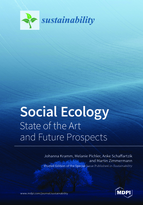IFF Social Ecology e-Newsletter Nr. 39 – January 2018
Projects – Publications – Media Resonance – Publication Download – Data Download – Job Announcements

MDPI, 2017
Gizicki-Neundlinger, M., Güldner, D. and, 2017. Surplus, Scarcity and Soil Fertility in Pre-Industrial Austrian Agriculture—The Sustainability Costs of Inequality. Sustainability 9. https://doi.org/10.3390/su9020265
Görg, C., Brand, U., Haberl, H., Hummel, D., Jahn, T., Liehr, S., 2017. Challenges for Social-Ecological Transformations: Contributions from Social and Political Ecology. Sustainability 9. https://doi.org/10.3390/su9071045
Haas, W., Andarge, B.H., 2017. More Energy and Less Work, but New Crises: How the Societal Metabolism-Labour Nexus Changes from Agrarian to Industrial Societies. Sustainability 9. https://doi.org/10.3390/su9071041
Haberl, H., Wiedenhofer, D., Erb, K.-H., Görg, C., Krausmann, F., 2017. The Material Stock–Flow–Service Nexus: A New Approach for Tackling the Decoupling Conundrum. Sustainability 9. https://doi.org/10.3390/su9071049
Hummel, D., Jahn, T., Keil, F., Liehr, S., Stieß, I., 2017. Social Ecology as Critical, Transdisciplinary Science—Conceptualizing, Analyzing and Shaping Societal Relations to Nature. Sustainability 9. https://doi.org/10.3390/su9071050
Kramm, J., Pichler, M., Schaffartzik, A., Zimmermann, M., 2017. Societal Relations to Nature in Times of Crisis—Social Ecology’s Contributions to Interdisciplinary Sustainability Studies. Sustainability 9. https://doi.org/10.3390/su9071042
Liehr, S., Röhrig, J., Mehring, M., Kluge, T., 2017. How the Social-Ecological Systems Concept Can Guide Transdisciplinary Research and Implementation: Addressing Water Challenges in Central Northern Namibia. Sustainability 9. https://doi.org/10.3390/su9071109
Mehring, M., Zajonz, U., Hummel, D., 2017. Social-Ecological Dynamics of Ecosystem Services: Livelihoods and the Functional Relation between Ecosystem Service Supply and Demand—Evidence from Socotra Archipelago, Yemen and the Sahel Region, West Africa. Sustainability 9. https://doi.org/10.3390/su9071037
Schaffartzik, A., Pichler, M., 2017. Extractive Economies in Material and Political Terms: Broadening the Analytical Scope. Sustainability 9. https://doi.org/10.3390/su9071047
Schleyer, C., Lux, A., Mehring, M., Görg, C., 2017. Ecosystem Services as a Boundary Concept: Arguments from Social Ecology. Sustainability 9. https://doi.org/10.3390/su9071107
Völker, C., Kramm, J., Kerber, H., Schramm, E., Winker, M., Zimmermann, M., 2017. More Than a Potential Hazard—Approaching Risks from a Social-Ecological Perspective. Sustainability 9. https://doi.org/10.3390/su9071039
Impressum
Institute of Social Ecology Vienna (SEC)
Alpen-Adria-Universität Klagenfurt, Wien, Graz (AAU)
A-1070 Vienna, Schottenfeldgasse 29, Austria
sec.newsletter [at] aau.at
www.aau.at/sec
To unsubscribe simply reply to this email with “unsubscribe” in the subject line.
Der Beitrag IFF Social Ecology e-Newsletter Nr. 39 – January 2018 erschien zuerst auf Alpen-Adria-Universität Klagenfurt.
Source: AAU TEWI











